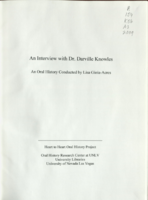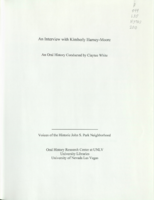Search the Special Collections and Archives Portal
Search Results

Transcript of interview with Paul Senzaki, Alan Hess, and Charlie White III by Stefani Evans and Claytee White, September 9, 2016
Date
Archival Collection
Description
Architect Paul Senzaki, and artist-illustrator Charlie White III recall their experiences of working in Las Vegas: Paul on Treasure Island, The Palms, Fremont Street Experience, and World Market Center and Charlie on Treasure Island and its successor, TI; New York New York. Architectural historian Alan Hess, who is an expert on Las Vegas architecture, offers historical context and asks pertinent questions. While this interview touches on several iconic Las Vegas buildings, the conversation mostly details why and how Steve Wynn's Treasure Island involved the labors of artists, illustrators, art directors, and designers of stage and screen as well as the those of architects, contractors, planners, and subcontractors.
Text

Transcript of interview with DeRuyter Butler by Stefani Evans and Claytee White, September 15, 2016
Date
Archival Collection
Description
Not many sixteen-year-olds assume the roles of father and mother to three younger siblings (one an infant), graduate from high school on time, and earn a full-ride scholarship (plus a loan) to a prestigious university. One such sixteen-year-old was Washington, D.C., native DeRuyter O. Butler, Executive Vice President of Architecture, Butler/Ashworth Architects, Ltd., LLC, and formerly Executive Vice President, Architecture, of Wynn Design & Development, LLC, and Director of Architecture, Atlandia Design & Furnishings, Inc. Determined to do right on behalf of his siblings and himself, Butler recruited his grandmother and enrolled in Catholic University, earning his B.S. in Architecture in 1977 while working overtime at the U.S. Post Office, buying a house in Maryland, and supporting his family. His first professional job in Philadelphia required him to rethink his living arrangements. Partnering with his sister, who assumed childcare duties during the week in Maryland, Butler lived in New Jersey during the week and commuted to Maryland on the weekends. After four years in that position and a short stint of being unemployed, in 1982 he became a draftsperson for Steve Wynn's Atlandia Design in Atlantic City. After he had worked with architects Joel Bergman and Paul Steelman in Atlantic City for four years, Wynn moved Atlandia Design to Las Vegas. Butler followed in 1986, bringing with him his grandmother and his youngest brother. In this interview, Butler discusses his unusual career path; the challenges of responding to and anticipating entertainment and recreation market trends; Wynn's insistence on always striving for "better"; and the importance of concealing service infrastructure in order to create the ultimate guest experience. He emphasizes Wynn's leadership in the gaming industry and with Clark County and the City of Las Vegas. He speaks to lessons learned from designing The Mirage, Bellagio, the Wynn, Wynn Palace, and Encore. Finally, he describes real-world limitations to building such as drought and historic water rights; traffic patterns, ride-hailing companies, and parking restrictions, and flight patterns and building heights.
Text

Irma I. Varela interview, March 5, 2019: transcript
Date
Archival Collection
Description
Interviewed by Barbara Tabach. Born and raised in Zacatecas, Mexico, Irma moved to Las Vegas in 1989. She is the Cultural Program Supervisor at Winchester Community Center and has devoted much of her career to preserving Hispanic cultural traditions in Las Vegas. She has been an active leader in local events such as Community Roots, International Food & Folk Life Festival, World Vibrations, and Dio de Los Muertos.
Text

Alexander Zapata interview, February 15, 2020: transcript
Date
Archival Collection
Description
Interviewed by Nathalie Martinez and Barbara Tabach. Alexander Zapata is a Venezuelan Emmy winning journalist committed to building trust with the community he reports to. He talks about growing up in Caracas and the political climate of Venezuela, including the persecution he faced as a journalist reporting during the under Nicolas Maduro regime. He shares his migration story, experience learning English and journalism work in Las Vegas with El Mundo, ESPN Deportes, Telemundo and Univision.
Text

Dr. Ruben J. Acherman interview, July 18, 2019: transcript
Date
Archival Collection
Description
Interviewed by Monsserath Hernandez, Laurents Bañuelos-Benitez, and Claytee White. Dr. Acherman has been practicing in Southern Nevada for nearly 20 years and continues to care for the community at the Children's Heart Center of Nevada in Las Vegas. Born and raised in the small town of Palmira, Colombia with his two sisters and parents. His father is from Romania and immigrated to Ecuador while escaping from Nazi occupied Europe during World War II. Dr. Acherman eventually moved to Cali, Colombia in order to attend medical school. knowing that he wanted to specialize in cardiology and being unable to do cardiology in Colombia he immigrated to the U.S. and specialized in pediatrics at USC. After practicing for two years in Toronto, he was contacted by Dr. Evans in 2001 with an offer to work at his practice in Southern Nevada where he was able to successfully perform the first balloon dilation in the state of Nevada.
Text

Francisco Aguilar interview, April 19, 2019: transcript
Date
Description
Interviewed by Monserrath Hernández. Francisco 'Cisco' Aguilar is a lawyer and the Founding Chairman of the Cristo Rey St. Viator College Preparatory High School. He talks about growing up in Tucson, Arizona in a Mexican household and continuing his passions to engage in social change as a lawyer. His career and community engagement led him to become a lobbyist, a fellow in Germany, and serve on various committees such as the Catholic Charities Board, Opportunity 180 Board, and the Nevada Athletic Commission. His oral history demonstrates his dedication to providing a future to the Latinx youth of Las Vegas.
Text

Irene Cepeda interview, April 24, 2019: transcript
Date
Description
Interviewed by Monserrath Hernández, Nathalie Martinez and Rodrigo Vázquez. Irene Cepeda is a woman dedicated to serving the Latinx as well as all minority groups in education in Southern Nevada. As a Las Vegas native, she grew up alongside the Latinx community here and is a proud Latina from Nicaraguan roots. She is dedicated to uplifting the Latinx community through her work with the Latino Youth Leadership Conference and college access specialist at Nevada State College. Now, as representative of District D on the Clark County School District Board of Trustees, she seeks to tackle the issues the district faces from acts of White supremacy to a lack of funding for English Language Learner families.
Text

Ron Current interview, March 16, 2012: transcript
Date
Archival Collection
Description
Ron Current's heart was always in the right place, with respect to social activism and his dedication to empowering the black community in Las Vegas. Inspired by Black Panther Party founders, Huey P. Newton and Bobby Seale, Ron started the Black Panther Party Las Vegas Chapter. He was also the director of public relations for the National Alliance Against Racist and Political Repression; an organization created to work in tandem with the National Association for the Advancement of Colored People, NAACP, to eliminate racial inequality. Ron describes the overall atmosphere of the Westside community in Las Vegas during the early days, as chaotic, drug infested, and riddled with daily gang related shootings. He also recalls the historic preservation attempts made by leading members of the Westside community, such as Sarann Knight Preddy. Ron recalls working at the University Medical Center while recruiting for the Black Panther Party Las Vegas Chapter. This interview demonstrates the power of love. As the founder and leader of the Black Panther Party Las Vegas Chapter, Ron was named one of the most influential blacks in Las Vegas by the Sentinel Voice. He recalls utilizing his hands-on leadership approach towards capacity building and the successful implementation of community mobilization strategies and methods. He was a champion for educational equity, equal access to employment opportunities, and economic equality in Las Vegas, Nevada.
Text

Transcript of interview with Dr. Darville Knowles by Lisa Gioia-Acres, October 9, 2008 and November 9, 2008
Date
Archival Collection
Description
Dr. Darville Knowles was born in Miami, Florida, in 1948. His mother and father were schoolteachers in Dade County. After their divorce in 1962, Darville's mother relocated to Las Vegas with her two sons and took a teaching position here. Dr. Knowles comments on the differences between Miami and Las Vegas as far as segregation regarding housing, education, and job opportunities. He also mentions that his grandmother had emigrated from the Bahamas and that she impressed on them to make their own situation and community better. He recalls that track and field athletics were desegregated before the contact sports, such as football and basketball. Darville and his brother Michael (a lawyer in Miami) both graduated from college. Darville attended Howard University and Stanford University Medical School and completed his internship at the Jewish Hospital of St. Louis. Dan Wilkes, a family friend and pathologist in Las Vegas, convinced Darville to look at Las Vegas for job opportunities. After trying St. Louis, Atlanta, Houston, and Los Angeles, Dr. Knowles finally settled in Las Vegas in 1982 and "grew' his practice at Sunrise Hospital. Dr. Knowles comments on health problems in Las Vegas related to eating choices, lack of exercise, and poor air quality. He describes how HMOs have changed the practice of medicine and gives his opinions on how health care should be addressed by Congress. He also discusses the future of medicine, the research he was involved in, and the AIDS crisis. Dr. Knowles talks about how medicine has changed since 1982, the large number of respiratory problems that he treats, and comments further on HMOs and the fixture of medicine in Las Vegas. He also shares that he found time to author a murder mystery and has plans to write more.
Text

Transcript of interview with Kimberly Harney-Moore by Claytee White, June 16, 2010
Date
Archival Collection
Description
Kimberly Harney-Moore and her three siblings were raised in the John S. Park Neighborhood in the 1960s and 1970s. Their parents, Tim and Kathleen Hamey, were educators. A nostalgic feeling for the neighborhood remains; perhaps, rekindled when she had close friends buy a house across the street from her childhood home. In this interview, Kimberly talks about the inviting character of the area's architecture, mentions a few names of neighbors she babysat for, and fondly recalls her job at Luv-Its Custard shop. There was a time when she would drive through the old neighborhood and be saddened by the lack of upkeep and the changes, but today it is a place being reborn to a new generation. Note: Tim Harney and Kathleen Harney, Kimberly parents, are also participants in the Voice of the Historic John S. Park Neighborhood oral history project.
Text
